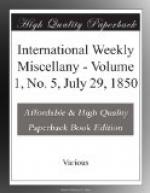a regular, long-drawn, and truly pleasing melody,
that in spite of his hoarse, and I am afraid, drunken
voice, I used to wish for it of an evening, and hail
it when it came. It lasted for some years, then
faded, and went out; I suppose, with the poor old
weather-beaten fellow’s existence. This
sense of quiet and repose may have been increased by
an early association of Chelsea with something out
of the pale; nay, remote. It may seem strange
to hear a man who has crossed the Alps talk of one
suburb as being remote from another. But the sense
of distance is not in space only; it is in difference
and discontinuance. A little back-room in a street
in London is further removed from the noise, than
a front room in a country town. In childhood,
the farthest local point which I reached anywhere,
provided it was quiet, always seemed to me a sort
of end of the world; and I remembered particularly
feeling this, the only time when I had previously visited
Chelsea, which was at that period of life....
I know not whether the corner I speak of remains as
quiet as it was. I am afraid not; for steamboats
have carried vicissitude into Chelsea, and Belgravia
threatens it with her mighty advent. But to complete
my sense of repose and distance, the house was of
that old-fashioned sort which I have always loved
best, familiar to the eyes of my parents, and associated
with childhood. It had seats in the windows,
a small third room on the first floor, of which I
made a
sanctum, into which no perturbation
was to enter, except to calm itself with religious
and cheerful thoughts (a room thus appropriated in
a house appears to me an excellent thing;) and there
were a few lime-trees in front, which in their due
season diffused a fragrance.
[Footnote 1: The Autobiography of Leigh Hunt.
Two volumes. Harper & Brothers. 1850.]
* * * *
*
LAMARTINE’S new romance.
The great poet of affairs, philosophy, and sentiment,
before leaving the scenes of his triumphs and misfortunes
for his present visit to the East, confided to the
proprietors of Le Constitutionel a new chapter
of his romanticized memoirs to be published in the
feuilleton of that journal, under the name of
“Genevieve.” This work, which promises
to surpass in attractive interest anything Lamartine
has given to the public in many years, will be translated
as rapidly as the advanced sheets of it are received
here, by Mr. Fayette Robinson, whose thorough apprehension
and enjoyment of the nicest delicacies of the French
language, and free and manly style of English, qualify
him to do the fullest justice to such an author and
subject. His version of “Genevieve”
will be issued, upon its completion, by the publishers
of The International. We give a specimen
of its quality in the following characteristic description,
of Marseilles, premising that the work is dedicated
to “Mlle. Reine-Garde, seamstress, and formerly
a servant, at Aix, in Provence.”




